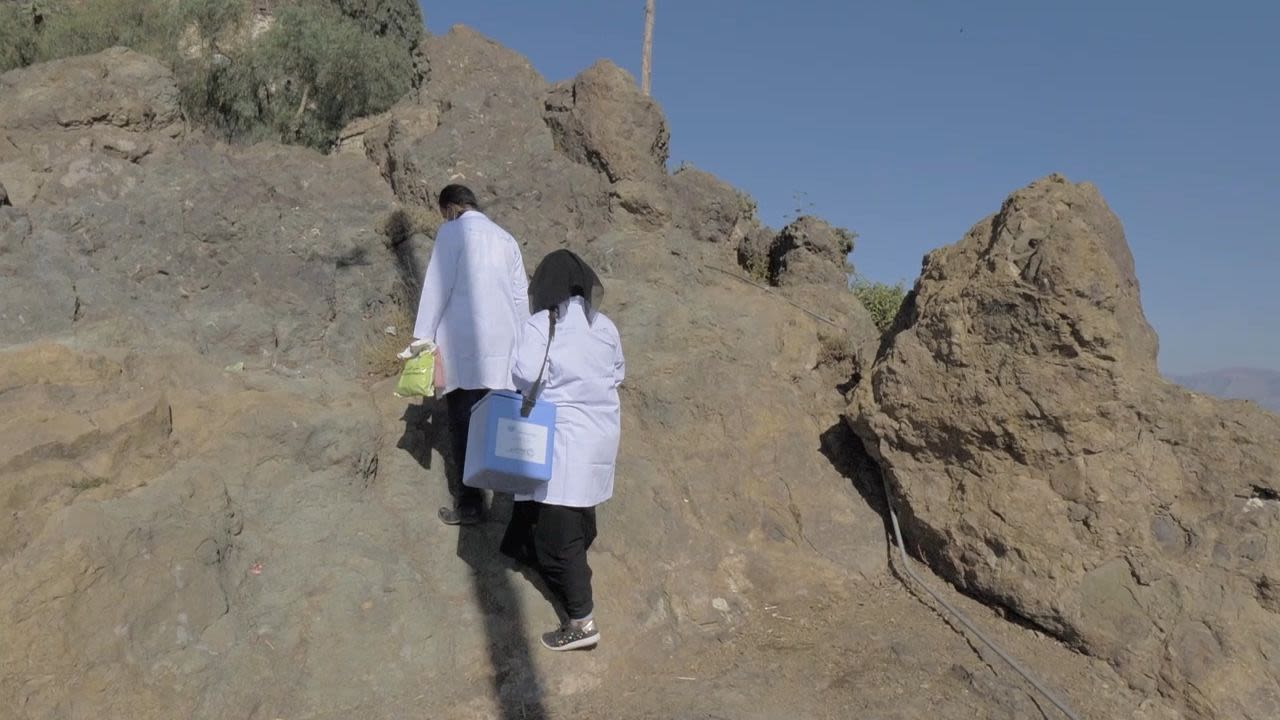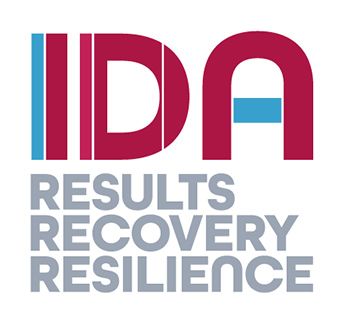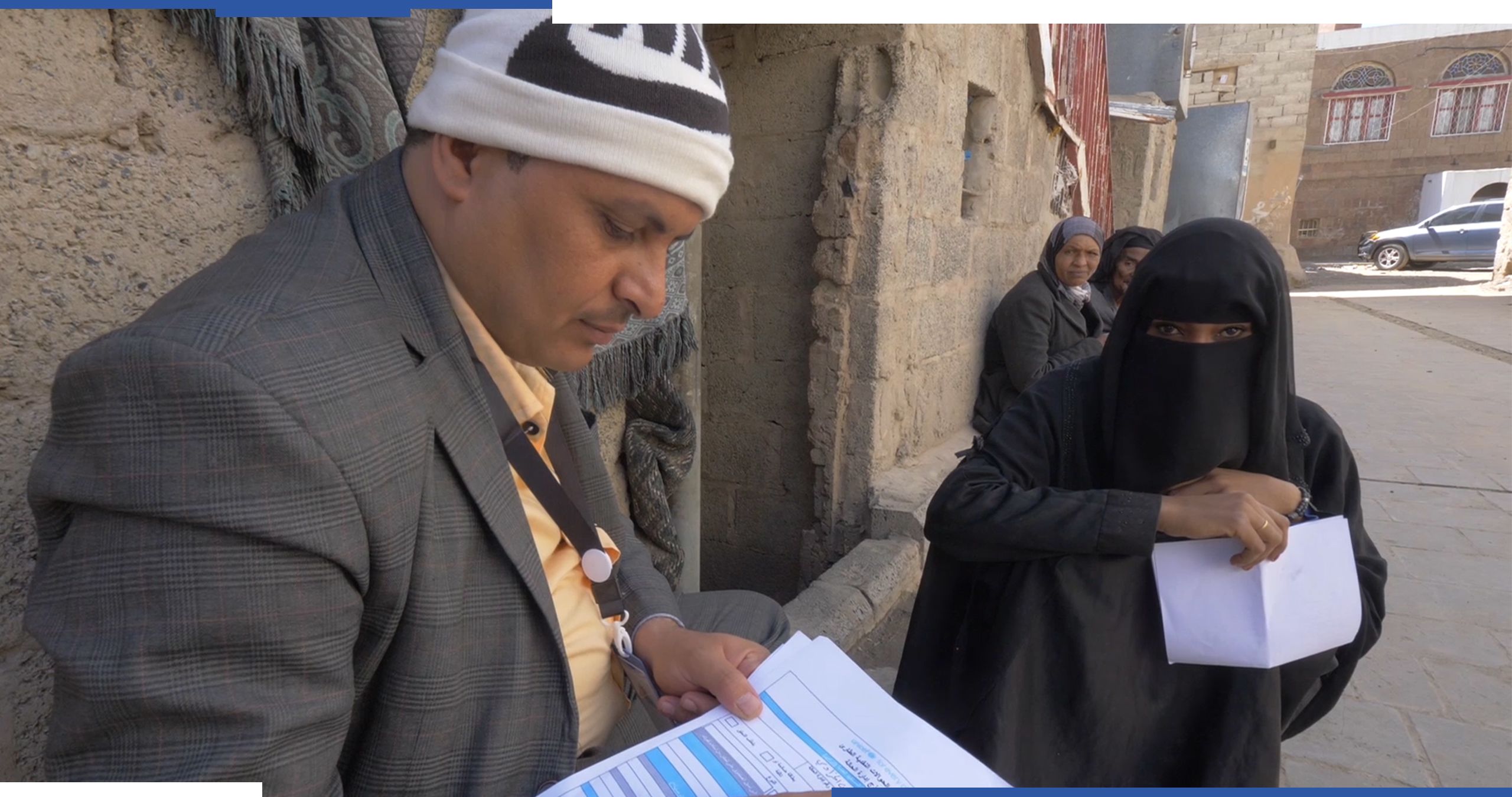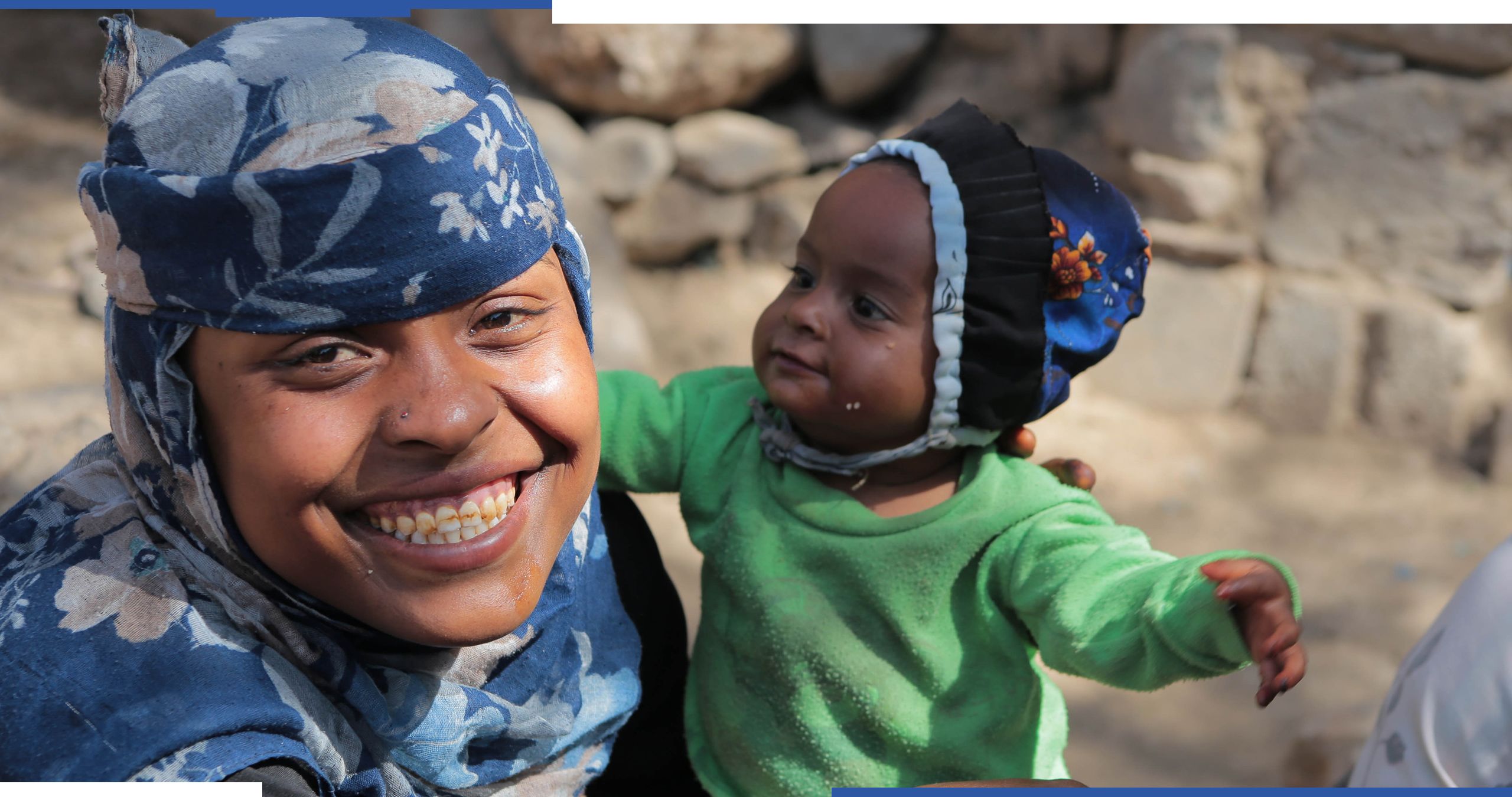Heeding the Call of a Country in Crisis
The World Bank and Partners in Yemen

Years into civil war, millions of Yemenis are in desperate need of food, shelter and healthcare.
Already the poorest country in the Middle East and North Africa, persistent conflict since 2015 has kept Yemen in a relentless state of crisis. The COVID-19 pandemic has further torn at the seams of thread-bare medical and social protection systems, intensifying the need for urgent action.
Amidst this expanse of uncertainty, the stories of the Yemeni people are full of rebuilding, hope and resilience.
2013
This is Hassan. He is born to Abdul and Muna in a rural town in Yemen.
Two years later, as Hassan enters his childhood, civil war breaks out in earnest. Hassan and his family have to leave their home of 10 years and find safety.
2015
After an arduous journey, Hassan’s family arrives in a camp for internally displaced persons. They are hungry and tired. Most of their belongings have been lost on the journey. They miss having a home.
Hassan’s experience is reflective of the reality faced by millions across Yemen.
Yemen is, unfortunately, not alone in its suffering. An estimate by the United Nations Office for the Coordination of Humanitarian Affairs puts violent conflicts around the world at a 30-year high. Up to two thirds of extreme poverty worldwide is expected to be concentrated in fragile settings by 2030.
The International Development Association—the World Bank’s fund for the poorest countries—is laying the foundation for recovery by supporting institution-building, restoring economic opportunities, and nurturing human capital.
"IDA had a presence in Yemen long before the onset of the conflict, and it will be there as long as needed to support and strengthen the country’s institutions, to ensure the delivery of essential services, and to set the conditions for lasting peace,” said Marina Wes, World Bank Country Director for Egypt, Yemen, and Djibouti.

2016
The IDA-financed Crisis Response Project goes into effect. Hassan’s family is among millions of internally displaced persons receiving food, temporary employment and access to key services through this project.
2017
A cholera outbreak rips through the country, with the cause linked to deteriorating sanitation and water supply disruptions. Young children are hit hard. In the meantime, two more IDA projects are approved to provide emergency health services and nutrition, and restore critical urban services like water and transport.
2017
A few months later, Abdul is called to the entrance of the camp. It is a moment of joy! His brother has found them. Hassan’s family will move into a modest home and, for the first time in over a year, there will be a roof over their head.
2018
Hassan’s family has settled into the house and they are in relative safety. Yet without electricity, critical services like light and waste management are not available. Later that year, an emergency electricity access project starts financing off-grid solar to ensure access to electricity in rural and peri-urban areas. It will soon reach Hassan’s family.
Last year, as the COVID-19 pandemic caused further setbacks in fragile and conflict-affected areas—plunging millions of additional people into extreme poverty—IDA quickened the pace of its response. Between the onset of the pandemic and April 2021, IDA committed $15.2 billion to Fragile and Conflict-affected Situations (FCS), half in the form of grants.
"The protracted conflict in Yemen has devastated millions of children’s lives. Schools and hospitals are regularly targeted, and basic services and infrastructure are on the verge of collapse. Today, IDA’s support enables UNICEF to give children and their families access to essential services and to lifesaving cash transfers, contributing to provide a much-needed social safety net in Yemen."
These investments are possible thanks to the historic commitment of $26 billion to FCS under IDA’s 19th policy and financing framework—known as IDA19. Each IDA replenishment mobilizes contributions from IDA donors, contributions from the World Bank, and financing raised from the capital markets.
The IDA-supported interventions in Yemen have been implemented in concert with long-standing partners at the United Nations and local organizations. This has been critical to their success.
2020
Across Yemen, the death toll climbs to a staggering 233,000. Just as COVID-19 arrives in the country. And desert locusts arrive, threatening crops and food security in an already famine-prone Yemen. Three IDA projects go into effect to address the triple threat of COVID-19, food insecurity and conflict.
2021
Hassan is now 8 years old. He has never been to school before. But a new education and learning project could soon change that. A separate IDA-financed project also comes into effect to enhance access to food and nutritious diets for all.
As millions of other families like Hassan's across Yemen gear up to face their future amid uncertainty, #IDAworks with partners and communities to rebuild their lives and ensure their resilience.
“IDA support to the Public Works Project is critical as it enables us to address urgent needs and empowers local communities in Yemen. The project has expanded access to basic services and empowered local communities, across the country, by putting them in charge of identifying necessary infrastructure.”
Attention has now turned to the upcoming IDA20 replenishment. The World Bank is poised to step up its support for green, resilient, and inclusive recovery in Yemen, building on the strong foundation of IDA-supported projects currently underway.
These are stories of the partnerships IDA projects involve in Yemen, and the people they impact.

Above: Mohammed Hassan Saleh works for a cash transfer program supported by IDA, in partnership with UNICEF. The program fills a gap in Yemen’s social welfare system and serves as a lifeline to millions. Photo: UNICEF
Cash Transfers.
A lifeline to millions
Mohammed Hassan Saleh is a national case manager attached to a life-saving cash transfer program—the Emergency Social Protection Enhancement Project. Each morning, he takes on different cases and works to advocate on behalf of beneficiaries—with the end goal of getting much-needed cash in the hands of Yemeni families.
By filling the void left by Yemen’s social welfare system, which suspended operations in 2015, the cash transfer program provides a lifeline to millions of recipients while laying the groundwork for reviving and strengthening the country’s social welfare system.
Today, Mohammed is meeting Hana’a, a young woman who was displaced with her family from their home in Hodeida as fighting broke out along the west coast of Yemen. Hana’a has had trouble accessing the family’s social welfare payment since her father passed away. Looking for support, she called the program’s toll-free call center, which is when Saleh was dispatched to verify Hana’a identity.
The backbone of the program—financed by IDA and implemented by UNICEF and local partners—is a state-of-the-art management information system. It secures the data of all recipient families across Yemen’s 333 districts, enabling real-time monitoring, data management, and reporting.
“This conflict is taking a massive toll on social and economic prospects for 30 million people in Yemen. In my experience, pragmatic and best-fit solutions like those from this project can break cycles of violence. We see every-day heroes in communities making these solutions possible on the ground. We are proud to enable them, with support from IDA.”
“Hana’a didn’t have a national I.D., and this was the only problem,” explained Mohammed.
After confirming Hana’a identity against the country’s original social welfare system’s list, she was authorized as the household’s beneficiary. This allowed her to collect her payment immediately at one of the project’s 1500 payment sites.
“I used the money to buy flour, rice, cooking oil, onions and other stuff,” said Hana’a.”
“My family was very happy. I was happy too.”
Yahya Yusouf has also benefitted from the cash transfer program. His story—like many of those in Yemen—is lined with tragedy. But today, he is finding glimmers of hope.
Cash Transfers.
A lifeline to millions
Mohammed Hassan Saleh is a national case manager attached to a life-saving cash transfer program—the Emergency Social Protection Enhancement Project. Each morning, he takes on different cases and works to advocate on behalf of beneficiaries—with the end goal of getting much-needed cash in the hands of Yemeni families.
By filling the void left by Yemen’s social welfare system, which suspended operations in 2015, the cash transfer program provides a lifeline to millions of recipients while laying the groundwork for reviving and strengthening the country’s social welfare system.
Today, Mohammed is meeting Hana’a, a young woman who was displaced with her family from their home in Hodeida as fighting broke out along the west coast of Yemen. Hana’a has had trouble accessing the family’s social welfare payment since her father passed away. Looking for support, she called the program’s toll-free call center, which is when Saleh was dispatched to verify Hana’a identity.
The backbone of the program—financed by IDA and implemented by UNICEF and local partners—is a state-of-the-art management information system. It secures the data of all recipient families across Yemen’s 333 districts, enabling real-time monitoring, data management, and reporting.
“This conflict is taking a massive toll on social and economic prospects for 30 million people in Yemen. In my experience, pragmatic and best-fit solutions like those from this project can break cycles of violence. We see every-day heroes in communities making these solutions possible on the ground. We are proud to enable them, with support from IDA.”
“Hana’a didn’t have a national I.D., and this was the only problem,” explained Mohammed.
After confirming Hana’a identity against the country’s original social welfare system’s list, she was authorized as the household’s beneficiary. This allowed her to collect her payment immediately at one of the project’s 1500 payment sites.
“I used the money to buy flour, rice, cooking oil, onions and other stuff,” said Hana’a.”
“My family was very happy. I was happy too.”
Yahya Yusouf has also benefitted from the cash transfer program. His story—like many of those in Yemen—is lined with tragedy. But today, he is finding glimmers of hope.
Above: Mohammed Hassan Saleh works for a cash transfer program supported by IDA, in partnership with UNICEF. The program fills a gap in Yemen’s social welfare system and serves as a lifeline to millions. Photo: UNICEF
The stories of Yahya and Hana’a demonstrate that—even in times of crisis—IDA projects work to save lives.

Image above: Wasila, 27, is a beneficiary of IDA’s cash-for-work program, implemented by the UNDP to build skills, generate income and serve communities. Photo: Yemen Social Fund for Development
Cash for Work
Economic opportunities for people and communities.
“I wanted to earn my money through work,” said twenty-seven-year-old Wasila, one of many Yemenis for whom the search for employment is a daunting challenge. She is benefitting from an IDA-financed cash-for-work program. Implemented by the United Nations Development Programme (UNDP), the program provides much-need economic opportunities for people and communities.
“UNDP’s goal is to both build people’s skills and provide income for people in search of employment opportunities, said Auke Lootsma, UNDP Yemen’s Resident Representative. “We also consider the needs of the person’s community and how they may be able to contribute to its development and make it more resilient."
Wasila lives with her family in a camp west of Taiz city, having fled the fighting that surrounded her home in the mountainous region of Jabal al Habashi. Today, she has learned to make bracelets, paint a local school building and other tasks that serve her community.
The cash-for-work program is also the reason Wasila can afford flour, rice and oil to care for her ageing parents and disabled grandmother.
So far, nearly 423,000 people have participated in the program, nearly a quarter of which are women.
“If grandmother is hungry I feed her, bring her water, and look after her. I am able to buy her anything she asks for,” she beams with pride.
Yemen is one of the most food-insecure countries in the world. The UN estimates that two-thirds of Yemenis—more than 24 million people—are food insecure, 10 million are at risk of famine, and 2 million children require treatment for acute malnutrition.
The recently approved Yemen Food Security Response and Resilience Project will deliver immediate support to households through cash-for-work opportunities. It also aims to build long-term resilience by supporting agricultural production and providing nutritious food to vulnerable families.
Cash for Work
Economic opportunities for people and communities.
“I wanted to earn my money through work,” said twenty-seven-year-old Wasila, one of many Yemenis for whom the search for employment is a daunting challenge. She is benefitting from an IDA-financed cash-for-work program. Implemented by the United Nations Development Programme (UNDP), the program provides much-need economic opportunities for people and communities.
“UNDP’s goal is to both build people’s skills and provide income for people in search of employment opportunities, said Auke Lootsma, UNDP Yemen’s Resident Representative. “We also consider the needs of the person’s community and how they may be able to contribute to its development and make it more resilient."
Wasila lives with her family in a camp west of Taiz city, having fled the fighting that surrounded her home in the mountainous region of Jabal al Habashi. Today, she has learned to make bracelets, paint a local school building and other tasks that serve her community.
The cash-for-work program is also the reason Wasila can afford flour, rice and oil to care for her ageing parents and disabled grandmother.
So far, nearly 423,000 people have participated in the program, nearly a quarter of which are women.
“If grandmother is hungry I feed her, bring her water, and look after her. I am able to buy her anything she asks for,” she beams with pride.
Yemen is one of the most food-insecure countries in the world. The UN estimates that two-thirds of Yemenis—more than 24 million people—are food insecure, 10 million are at risk of famine, and 2 million children require treatment for acute malnutrition.
The recently approved Yemen Food Security Response and Resilience Project will deliver immediate support to households through cash-for-work opportunities. It also aims to build long-term resilience by supporting agricultural production and providing nutritious food to vulnerable families.
Image above: Wasila, 27, is a beneficiary of IDA’s cash-for-work program, implemented by the UNDP to build skills, generate income and serve communities. Photo: Yemen Social Fund for Development

Image above: Hamama is among the over 200,000 people whose homes and lives have been lit up by an IDA and UNOPS project, amid conflict and power-cuts. Photo: Yemen Social Fund for Development
Access to Electricity.
A beam of hope
Another critical basic service has suffered because of reduced capacity during the civil war: electricity. Power outages have become commonplace across the country.
“In Sana’a, from morning to night, people worry about the petrol shortage, power outages, and simply getting the basics to live,” explains Faizah Al-Sulimani, who works with the Small and Micro Enterprise Promotion Service, a local organization in Yemen supported by the World Bank. “As Yemenis, we need to find another solution so that we can have a good quality of life.”
In electricity-starved Yemen, one project is serving as a beam of hope for many. Working with the United Nations Office for Project Services (UNOPS), the IDA-supported Yemen Emergency Electricity Access Project provides financing and grants for high-quality, small-scale solar energy systems for rural and peri-urban households. Its impact is transformational.
Hamama is one of the 235,000 people that have benefitted from the project. A widow with no income in an isolated part of Yemen, the darkness of night was a trap that prevented her from the most basic of chores or activities. The project connected her with electricity access through solar panels, enough to power her home.
"Now I can use the bathroom or kitchen safely at night, and even praying is easier in the light," she said.
Access to Electricity.
A beam of hope
Another critical basic service has suffered because of reduced capacity during the civil war: electricity. Power outages have become commonplace across the country.
“In Sana’a, from morning to night, people worry about the petrol shortage, power outages, and simply getting the basics to live,” explains Faizah Al-Sulimani, who works with the Small and Micro Enterprise Promotion Service, a local organization in Yemen supported by the World Bank. “As Yemenis, we need to find another solution so that we can have a good quality of life.”
In electricity-starved Yemen, one project is serving as a beam of hope for many. Working with the United Nations Office for Project Services (UNOPS), the IDA-supported Yemen Emergency Electricity Access Project provides financing and grants for high-quality, small-scale solar energy systems for rural and peri-urban households. Its impact is transformational.
Hamama is one of the 235,000 people that have benefitted from the project. A widow with no income in an isolated part of Yemen, the darkness of night was a trap that prevented her from the most basic of chores or activities. The project connected her with electricity access through solar panels, enough to power her home.
"Now I can use the bathroom or kitchen safely at night, and even praying is easier in the light," she said.
Image above: Hamama is among the over 200,000 people whose homes and lives have been lit up by an IDA and UNOPS project, amid conflict and power-cuts. Photo: Yemen Social Fund for Development
The project is also focused on providing grant-financed solar power systems to facilities such as hospitals and schools. It, too, is saving lives.
As of February 2021, electricity had been installed in 119 health facilities, 149 schools, and 25 water wells, restoring critical services to over 1.7 million people.
The health center in the Horour-Dhamar Governorate in Yemen had been one of many casualties of the collapse of public electricity supply. This forced members of the community to travel long distances to access health services.
Now, with a steady supply of solar power, the center is open 24 hours a day.
"Vaccinations and lab work are now accessible to us," said Ghawar Al-Haj, a 40-year-old member of the community.

Pushing the boundaries to ensure recovery and resilience for all
Ultimately, peace is a requisite for a durable recovery in Yemen. But recent experience has shown that substantial progress in meeting the basic needs of Yemenis is possible in the face of ongoing conflict and COVID-19.
IDA has a unique role to serve in Yemen and other countries that suffer from conflict and fragility, with an unmatched ability to convene and coordinate national organizations, international agencies and donors.
"The severity of the situation in Yemen—and many other fragile and conflict-affected countries—has required us to push the boundaries of development assistance. We have clearly demonstrated that significant results are possible over a short period of time, especially when working closely with national institutions and other partners."
The journey ahead is laden with challenges, but IDA is committed to Yemen until recovery and resilience become a reality for all.
Related Links:
- World Bank Approves $20 Million in Grants to Support COVID-19 Vaccination Rollout in Yemen
- International Development Association
- The World Bank in Yemen
- Working for the People of Yemen
- Empowering the Poorest Countries Towards a Resilient Recovery
To Learn More:
The map below provides details of IDA projects implemented by UN agencies and local partners in Yemen.
Disclaimer: The maps displayed on the World Bank website are for reference only. The boundaries, colors, denominations, and any other information shown on these maps do not imply, on the part of the World Bank Group, any judgment on the legal status of any territory, or any endorsement or acceptance of such boundaries.